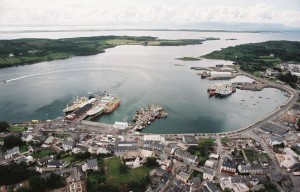Business in Killybegs could be severely affected unless a solution is found to pay for tugboat services at the leading port.
At present, a private company, Sinbad Marine Services Ltd., is meeting the cost of providing these services, but with losses running at more than €1,000 a day, it cannot continue to do so.
And if Sinbad withdraws its tug services, there will be immediate consequences for freezer vessels, cruise ships, cargo vessels, offshore oil & gas ships and emergency response services.
The Killybegs Fishermen’s Organisation is calling for an urgent meeting with the Department of Agriculture, Food & the Marine, the Irish Coast Guard and Donegal County Council as a first step towards finding a solution and maintaining these essential services.
Meanwhile, the two existing tugs owned by Sinbad Marine Services Ltd. are up for sale and the larger of the two vessels could be gone by the end of March.
The loss of tug services in the port would be a severe blow to existing jobs and to potential job creation in the area. The highly-qualified crews for the two tugs would be first to be hit. There will be immediate effects on workers in the harbour area, especially stevedores and transport. There could also be cut-backs in the tourism sector and in fish processing in the port.
Without a tug service, many large ships would be unable to come to Killybegs port at all, or would be greatly restricted in doing so. These would include cruise ships, cargo vessels bringing in loads such as parts for wind turbines, freezer ships exporting fish around the world , and service vessels for the burgeoning offshore hydrocarbons industry.
But the most serious implications of the absence of tugs would be a lack of back-up support for the emergency services.
At present, both the Fire Service operated by Donegal County Council and the Coast Guard, operated by the Department of Transport, Tourism & Sport, rely completely on the Sinbad Marine tugs to deal with any emergency on the water in Killybegs.
In the event of an oil spillage in the harbour or a fire onboard a vessel, the first call-out would be for a fire-fighting tug to manoeuvre the vessel to a safe area or to position floating booms to contain the spillage.
At present, Sinbad Marine Services provide two tugs equipped with fire-fighting equipment and oil-spill response capabilities. The tugs are also essential to control any vessel which experiences a loss of power while manoeuvering in the harbour to tow it to safety, as has happened on two occasions in the past few months.
Jim Parkinson, Managing Director of Sinbad Marine Services Ltd said “In the 1980s, we had a lot vessels that could not enter the port of Killybegs under certain weather conditions and vessels were often left waiting six or seven days at anchor due to a lack of availability of tugs.
“Since the new pier was built, the size of vessels visiting Killybegs has drastically increased and I developed a tug service accordingly. Unfortunately, we have now entered a situation whereby the tugs that we provide are no longer financially viable, and the harbour at the same time, has become dependent on these tugs to attract business.”
Mr. Parkinson goes on to explain that: “Basically, the cost of providing a tug service in Killybegs is about €600,000 per year. Turnover for tug services last year was €194,000. So, the net effect is that we are subsidising Killybegs Port to the tune of over €400,000 per year. Present users of the tug services wish to pay on an ad-hoc basis (use tugs if needed on the day due to weather conditions) and this arrangement is not sustainable”.
Mr Parkinson explained that tug services must be placed on a sustainable financial model. Similar difficulties have to be resolved in all commercial ports but Killybegs, as a Sea Fishery Harbour Centre under the direct control of the Department of Agriculture, Food and the Marine, has an added layer of complication due to the fact that no commercial guidelines exist.
“The Department of Agriculture will not address the problem of guidelines for use of tugs in Killybegs Port”, he said. “They’re washing their hands of the issue and saying that it’s basically a commercial decision between the tug operator and the potential users.”
And he was blunt in his view of the future: “If we remove our tug services from Killybegs, which we will unless this is resolved, the result will mean a severe downgrading of the Port of Killybegs. We need some subvention from some source to provide the service. The fish processors in Killybegs, the Department of Agriculture and Donegal County Council have to share the costs.
These tugs have to be considered as critical infrastructure in the same way as the fire station would be in the town, but nobody is putting their hand in their pocket.
“This service has to be paid for 365 days a year, 24 hours a day. And there goes our job creation because job creation is dependent on getting more traffic into the port but there’s no means of supporting the infrastructure required to do so”, Mr Parkinson said.
Tags:





